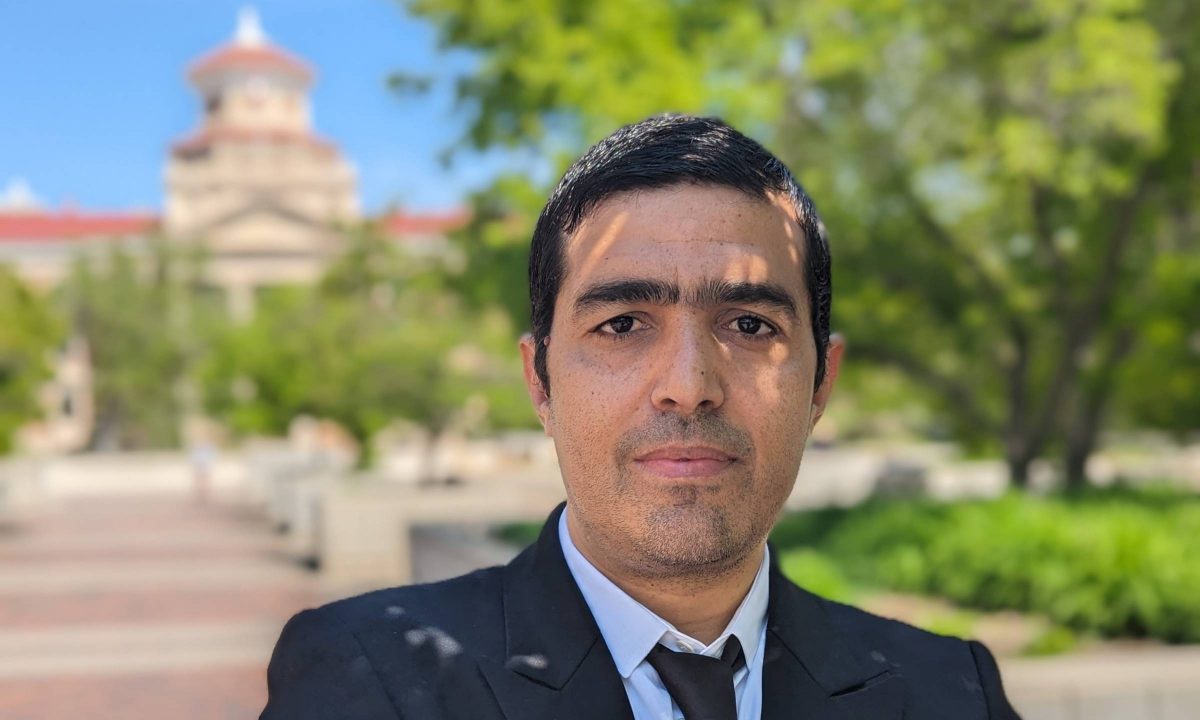
Dr. Faouzi Bellili, recipient of the Terry G. Falconer Memorial Rh Institute Foundation Emerging Researcher Award in the Applied Sciences category.
Meet Faouzi Bellili, 2023 Rh Award Winner in the Applied Science category
Faouzi Bellili, an assistant professor in the Department of Electrical and Computer Engineering, is at the forefront of developing advanced communication systems.
Bellili is the 2023 recipient of the Terry G. Falconer Memorial Rh Institute Foundation Emerging Researcher Award in the Applied Sciences category, in recognition of his innovative work in wireless communication and networking infrastructure. UM Today caught up with Bellili to learn more about him and the research he is undertaking.
Can you tell us a bit about yourself and your research?
I’m an assistant professor in the Department of Electrical and Computer Engineering and a co-founder of the MARCONI Lab at the University of Manitoba. Marconi is named after the scientist who made the first transatlantic wireless transmission and stands for Manitoba Advanced Research on Communication and Networking Infrastructure.
My research focuses on wireless communication and covers many aspects of communication engineering. I follow a holistic research approach, addressing the limitations of the conventional divide-and-conquer methodology that is prevalent in communication engineering.
My work lies at the intersection of different theories, including communication and information theory, electromagnetic and antenna theory, circuit theory, signal processing and network design. By merging these concepts, I aim to develop cost-effective communication systems for future generation wireless networks, ensuring communication speed, energy efficiency, reliability, massive connectivity and security. My research involves both theoretical exploration and hardware prototyping to ensure practical relevance.
Why is this research important?
My research, particularly in wideband antenna array design and the associated signal processing algorithms, aims to create a sustainable and flexible wireless infrastructure. This infrastructure would allow multiple service providers to share the same network, much like how highways or bridges are shared.
Currently, each provider deploys its own network due to the lack of antenna technology that can operate across a broad spectrum. Developing this shared infrastructure can significantly reduce both capital and operational costs, making wireless services more affordable and accessible. It can also serve multiple purposes, including communication and sensing functionalities, encouraging investment in urban and remote areas.
Recognizing internet access as a fundamental human right, this research aims to democratize access to broadband, creating new opportunities and fostering inclusivity, thus contributing to a world where no one is left behind.
What does the Rh Award mean to you?
Winning the Rh Award is a great honour. It represents more than just recognition of my achievements—it symbolizes dedication, perseverance and passion in my pursuit of excellence.
This award signifies validation and affirmation from my peers, mentors and the broader community, acknowledging the hard work and commitment invested in my research. Beyond personal gratification, this award brings a profound sense of responsibility, motivating me to push the boundaries of my capabilities and make meaningful contributions to my field and society. It reflects the collective effort of those who have supported and inspired me. Ultimately, this award fuels my determination to use my talents and resources to effect positive change and leave a lasting legacy.
What do you hope to achieve in the future?
In the future, I hope to make significant contributions to my field by pioneering innovative solutions that push the boundaries of current knowledge and technology. I aim to collaborate with diverse teams of experts from various disciplines, fostering multidisciplinary approaches to tackle complex problems in wireless communication.
My aspirations extend beyond academic pursuits—I want to translate research findings into real-world applications that improve people’s lives. I also hope to inspire and mentor the next generation of researchers, nurturing their curiosity and passion for discovery while instilling a sense of social responsibility and ethical conduct.
Ultimately, my goal is to leave a meaningful legacy of innovation, progress, and positive change.
What about you might people find surprising?
What’s perhaps most unexpected about me is my journey into communication engineering. Throughout my formative years, my sights were set on a career in aeronautics, a field that continues to captivate me.
However, my path changed when I encountered a professor whose passion for telecommunications ignited a new fascination within me. His influence redirected my academic and professional trajectory.
Now, as a professor, I carry the weight of that transformative experience with me, reminding me of the impact educators can have on their students’ lives. It is a privilege to impart knowledge and inspire the next generation of learners.
Any advice for early career researchers and students?
My advice is to follow your passion. Pursue research topics that genuinely interest and excite you, as your passion will drive innovation and resilience through the inevitable challenges.
Stay curious and open-minded, embracing new ideas, perspectives and methodologies. The most innovative research often comes from interdisciplinary approaches and unconventional thinking. Embrace failure as a learning opportunity—research involves experimentation and setbacks, so view failure as a chance to learn, grow and refine your approach.
Research at the University of Manitoba is partially supported by funding from the Government of Canada Research Support Fund.






